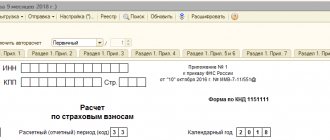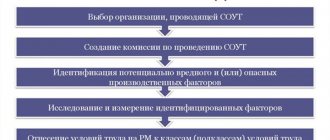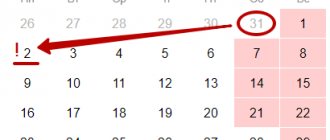Home / Taxes / What is VAT and when does it increase to 20 percent? / Declaration
Back
Published: 08/09/2017
Reading time: 8 min
0
233
The correctness of VAT calculation, its amount and timely payment to the state budget are regulated by the tax authorities. Thanks to the transition to electronic reporting, monitoring the accuracy of data provided by organizations has become much easier. If inconsistencies are identified, a desk audit is carried out.
- Desk inspection: definition and subject
- How is it produced?
- What is the time frame for production?
- Deadline for making a decision on a desk audit
- If an updated declaration is submitted during the inspection
- In what cases will additional documents be required?
- At what stage is the inspection of the territory carried out?
- Tax monitoring and desk audit
Desk tax audit for VAT: definition and subject
A desk audit of a VAT return is a form of control.
With its help, representatives of the tax service identify discrepancies and errors in the reporting submitted by the payer of the relevant tax (Articles 82, 87 of the Tax Code of the Russian Federation). Such an inspection is carried out on the territory of the tax authority; in general, a visit to the office of the company being inspected is not provided (Article 88 of the Tax Code of the Russian Federation). If necessary, documents and explanations are requested via telecommunication channels (TCS). At the same time, as of January 1, 2015, tax officials have the right to inspect the taxpayer’s premises during a desk audit.
A desk tax audit for VAT is a verification of the information provided by the taxpayer in the form of a declaration. The latter is the subject of verification.
The period allotted for carrying out the necessary procedures is 2 months. But in some cases it can be extended to 3 (Article 88 of the Tax Code of the Russian Federation). The period of the desk audit for VAT begins to count from the date (day) when the declaration was received by the tax service.
In 2021, a pilot project of the Federal Tax Service was launched, within the framework of which the period of VAT registration can be reduced to 1 month. Read more here.
How to avoid a fine when filing an amendment
Does adjusting the declaration always mean a fine? Not at all. If everything is done correctly, sanctions will be avoided. Moreover, even if the update comes with additional tax. The algorithm is described in paragraph 4 of Article 81 of the Tax Code of the Russian Federation. If an error is detected, you should:
- correct it and recalculate the VAT amount;
- calculate penalties (if the payment deadline has passed);
- transfer taxes and penalties to the budget;
- generate an updated declaration and send it to the Federal Tax Service.
It is better to do all this as quickly as possible. After all, you need to be in time before the tax authority itself discovers errors in the declaration. Then a fine will be imposed under Article 122 of the Tax Code of the Russian Federation in the amount of 20% of the underpaid amount. Similar consequences will occur if a VAT statement is first submitted, and only then the tax and/or penalties are paid.
The need to adjust the declaration may arise, including during the period of a desk audit of the primary report. If the Federal Tax Service identifies any inconsistencies during its course, it requests clarification. But even receiving such a request does not mean that the taxpayer will be fined. The inspectorate will invite him to independently check the report, find and correct errors.
Moreover, the Tax Service strongly recommends that payers correct reports and pay additional taxes without waiting for the results of the audit. In this case, no fines are imposed (letter of the Federal Tax Service dated August 20, 2018 No. AS-4-15/16075).
Deadline for desk audit for VAT and filing a VAT return
The deadline for filing a VAT return is the 25th day of the month following the tax period that has expired (clause 5 of Article 174 of the Tax Code of the Russian Federation).
At the same time, the period for a desk audit of the VAT return is 2 months from the date of submission of the tax return (clause 2 of Article 88 of the Tax Code of the Russian Federation), and within the framework of the pilot project, 1 month. Previously, this period was 3 months, but was reduced by the Law “On Amendments...” dated August 3, 2018 No. 302-FZ.
How to determine the start and end date of a desk audit? The answer to this question is in ConsultantPlus. If you don't already have access, get a free trial online.
Tax officers are required to complete desk audits after 2 months from the date of submission of the VAT return, while simultaneously meeting the following conditions:
- there are no contradictions in the declaration, and the information contained in it corresponds to information about transactions submitted by other taxpayers (or the unresolved discrepancies do not indicate an understatement of the amount of tax payable to the budget);
- there are no signs of violations of tax legislation leading to an underestimation of the tax payable (or an overestimation of the tax claimed for reimbursement), and there is no information indicating that the taxpayer has received an unjustified tax benefit.
If the taxpayer does not meet the above criteria and the tax authorities identify contradictions, then the period of the desk audit can be extended to 3 months.
The publication will introduce you to the features of a desk audit for reimbursement.
Actions of the company upon receipt of a request from the Federal Tax Service
Confirmation of admission is sent to the Federal Tax Service within 6 days. If confirmation is not sent, the Federal Tax Service restricts movements on the company’s current account.
Next, they control the report, check with customers and send a response in tabular form, or an updated report. Or a message to the Federal Tax Service employees that there are no shortcomings in the company. The response is sent via electronic reporting systems within 5 days from the date of receipt of the request.
For failure to provide explanations, the company is fined five thousand rubles, for a secondary case - twenty thousand rubles.
VAT declaration form
Order of the Federal Tax Service of Russia dated October 29, 2014 No. ММВ-7-3/ [email protected] approved:
- declaration form;
- the procedure for filling it out;
- format for reporting to tax authorities.
You can find out more about the composition of the declaration, download its form and sample from the materials in the section “What is the procedure for filling out a VAT declaration (example, instructions and rules)”.
If a company charges VAT and then claims the tax as a deduction, it will have to provide the relevant data on the invoices that formed the basis for the calculations. For this purpose, the declaration provides sections for reflecting data from the purchase book, sales book, and invoice journal.
Find out who is now required to fill out the invoice journal here.
Currently, tax inspectors have the opportunity to compare the data reflected in the sales book and purchase book of the selling company and the buying company. This makes it possible to identify, during a desk audit of VAT, unscrupulous persons who do not pay taxes to the budget, but claim to receive a VAT deduction.
Responsibility for violating the declaration submission form
Most VAT payers are required to file their returns electronically. If, instead of an electronic declaration, a paper declaration is submitted, the organization will face a fine.
In paragraph 5 of Art. 174 of the Tax Code of the Russian Federation states that a VAT return submitted on paper is not submitted. As a result, the consequences have become more serious: the fine has increased, and administrative liability is possible.
For more information about liability, see our material “What is the liability for a late declaration?” .
In addition, your organization’s account may be blocked (Clause 3, Article 76 of the Tax Code of the Russian Federation).
For more information about suspending account transactions, see our material “Late with your declaration? Get ready to block your account .
Receipt of electronic documents from the tax office must be confirmed
In clause 5.1 of Art. 23 of the Tax Code of the Russian Federation states that each taxpayer sending an electronic declaration to the tax service is obliged to ensure that the inspection receives from the inspectorate in electronic form via TKS the documents sent by the tax office during the control. What might your tax office require? This means:
- notice of summoning the taxpayer (Article 31 of the Tax Code of the Russian Federation);
- requirement to provide explanations (Article 88 of the Tax Code of the Russian Federation)/documents in relation to the submitted reports (Articles 93 and 93.1 of the Tax Code of the Russian Federation).
The list may be supplemented by other documents necessary for conducting a desk audit.
When a notice or demand is received, the taxpayer must send a receipt to the tax office confirming receipt. The legislation allows no more than 6 days for this from the date when the tax authorities requested documentation or clarifications on reporting.
See “Formalized response to the tax office’s demand for VAT – nuances.”
NOTE! Failure to fulfill the obligation to transfer the said receipt will have serious consequences (Article 76 of the Tax Code of the Russian Federation). Thus, the tax service has the right to freeze all transactions on the accounts of the offending company - from banking transactions to money transfers via electronic channels.
Cancellation of such a decision is possible on the basis of Art. 76 Tax Code of the Russian Federation. Frozen accounts are unblocked provided that the taxpayer:
- handed over a receipt confirming the receipt of documents that were sent by the tax office;
- provided the documents/explanations originally requested by the tax authority.
Then the cancellation of the order to block the account must occur no later than one day following the earliest of the specified dates.
In what cases will additional documents be required?
The basis for this may be:
- Inconsistency of data contained in the documents of the organization’s counterparties;
- A refund declaration has been submitted;
- An updated declaration was submitted for the period two years ago.
To do this, a written requirement is drawn up, which contains:
- Article of the Tax Code on the basis of which the requirement was drawn up;
- Deadline for submitting documents;
- List of documents indicating details, tax period;
- Details of the organization being inspected;
- Tax control event to which this requirement applies (For example, Desk audit for the second quarter of 2017).
The demand is delivered personally to a representative of the organization or sent by registered mail, if it is not possible to submit it in the first way. In this case, after six days it is considered accepted, regardless of whether the addressee received it or not (clause 1 of Article 93 of the Tax Code of the Russian Federation).
The list of documents provided includes:
- Invoices;
- Books of purchases and sales;
- Primary documents.
Most often, certified copies are provided (not necessarily notarized), but sometimes the tax office may require original documents.
Situations also arise when the inspection lists many additional clarifying documents - analysis of accounts, related to accounting policies, and others.
The list can be quite significant, and 10 days are allocated for the provision of documents. For failure to provide one or more, a fine of two hundred rubles per unit is imposed. You can write a letter requesting an extension of the specified period on the day the request is received. The tax office must provide a response within two days.
All required documentation must relate to the period under review; otherwise, excessively requested documents may not be provided - liability for this is not provided for by law. In order to protect yourself from litigation and loss in it, it is better to immediately send an explanation to the inspectorate, based on clause 2.8 of the Federal Tax Service letter dated July 16, 2013 No. AS-4-2/12705 on restrictions on the requested documentation.
When paying VAT, much fewer documents are required than when filing a return for reimbursement.
When can tax authorities request documents?
Tax authorities have the right to demand, during a desk audit, that the taxpayer submit invoices, primary and other documents related to the transactions reflected in the submitted declaration (Article 88 of the Tax Code of the Russian Federation). The following are cases when this right is subject to exercise:
- If the data provided by two different taxpayers for the same transaction do not correspond to each other.
- If the information specified in the declaration does not correspond to the data from the invoice journal.
- If inconsistencies are identified in the submitted declaration.
IMPORTANT! The intention to request documentation from the taxpayer must be based on compelling reasons. That is, the “irregularities” in the reporting identified by the fiscal service should indicate the taxpayer’s desire to underestimate the amount of tax payable and an attempt to overstate the amount of compensation from the budget.
To learn about what points may influence the occurrence of questions during an audit, read the material “VAT Declaration: The Most Common Errors and How to Correct Them .
Tax authorities accept any explanations regarding VAT only in electronic form. Find out about it here.
Clarified declaration or explanation
In order to understand what to send to the tax authorities in response to the request, you need to decide whether the error in the declaration influenced the understatement of the VAT amount:
- If an error resulted in an understatement of VAT obligations, the organization will need to submit an updated return.
- If the error did not affect the amount in any way, then it can be corrected either by submitting an explanation or by submitting an updated declaration.
The Federal Tax Service can send several demands at the same time, for example, two in two different sections. In this case, the organization must also prepare two explanations in response to each requirement. But if during the audit an error is discovered that led to a change in the VAT amount, then instead of two requirements you need to submit one updated declaration.
Desk inspection of VAT: territory - for inspection!
Representatives of the tax service, during a desk audit, have the right to inspect the territory of the organization, the premises it occupies, as well as other property (Article 92 of the Tax Code of the Russian Federation).
See also our material “Inspection: rules for conducting and reporting results” .
That is, a desk audit of VAT is work carried out by fiscal officials not only within the office, but also on the territory of the taxpayer.
When is an inspection allowed? Inspection is possible in the following cases (clause 1 of article 92, clauses 8 and 8.1 of article 88 of the Tax Code of the Russian Federation):
- submission of a declaration in which the amount of VAT is claimed for reimbursement;
ConsultantPlus experts explained how a desk audit of a declaration is carried out in the event of a VAT refund. Get trial access to the system and move on to the Ready-made solution.
- identification of contradictions and inconsistencies that give reason to believe that a business entity is trying to underestimate the amount of tax payable or overstate the amount of tax to be reimbursed.
The resolution of the controlling person conducting the inspection is a sufficient basis for inspecting the territories, premises and other property of a legal entity. At the same time, it must have the following characteristics:
- firstly, have motivation;
- secondly, to be approved by the head of the tax authority or his deputy.
A resolution that fully complies with these requirements is the basis for the fiscal service to have access to the territory/premises of the company being inspected. In addition, representatives of the tax service are required to have official identification.
When does the statute of limitations begin to count when committing a tax violation in relation to VAT?
The limitation period begins to run the day after the end of the tax period. This is stated in paragraph 1 of Art. 113 Tax Code Part I. The tax period for VAT is a quarter. If the offense was committed on April 2, then the statute of limitations will be calculated from June 30 of the same year.
Limitation period
The limitation period is three years from the date it starts. What does it mean? Within three years from the date the limitation period began to expire, the tax authorities have the right to bring claims against the taxpayer in court.
If the taxpayer actively interferes with tax authorities, avoids inspections, and does not provide the relevant documents, then the Tax Code, clause 1.1 of Art. 113 of the Tax Code, Part I allows you limitation period To suspend the statute of limitations, the tax authorities must draw up an act on preventing tax officials from conducting a tax audit. Such an obstacle may be a ban on access to the office premises of tax authorities. From the date of drawing up and signing the act, the suspension of the limitation period begins. And this suspension lasts until the tax authorities are allowed to carry out the appropriate tax audit.
What to do if the tax authorities file claims in court in violation of the statute of limitations?
The only way out in this situation is to go to court with a claim for the unlawfulness of presenting claims due to violation of the statute of limitations. But you need to be absolutely sure that you are right, i.e. thoroughly understand the current situation.
Tax monitoring and desk audit of VAT: points of contact
Starting in 2015, some taxpayers may be interested in a new form of tax control - tax monitoring.
To whom tax monitoring is available, see the material “From 01/01/2015, large taxpayers will be able to be “monitored”” .
The subject of tax monitoring is the correctness of tax calculations, as well as compliance with the deadlines for their payment to the budget, in particular this applies to VAT verification (Article 105.26 of the Tax Code of the Russian Federation).
Tax officials do not have the right to conduct desk (by the way, on-site, too) audits within the time period that falls under monitoring.
True, the legislator has provided several exceptions to this rule. For example, if during the period subject to monitoring, representatives of the tax inspectorate reveal that the amount of tax that should go to the budget does not correspond to what the company indicated in its declaration, an audit will be carried out.
Please note that tax monitoring can be carried out exclusively voluntarily. The obligatory basis for it is the decision made upon consideration of the application submitted by the organization initiating its implementation. Moreover, this is not the only thing required. The application must be supplemented with certain documents and a number of data must be provided about the organization.
The order of the Federal Tax Service dated April 21, 2017 No. ММВ-7-15/ [email protected] approved new forms of documents used when conducting tax monitoring. Find out about them by following the link .
How to appeal the results of a desk audit
There are two ways to refute the tax decision. File an appeal with a higher-ranking inspectorate, and if you are not satisfied with its conclusion, go to arbitration.
An official of a higher rank, having received a complaint, has the right:
- do not take action. Leave the conclusion in force, but not satisfy the petition;
- abolish or change the conclusion of the Federal Tax Service in whole or in half;
- accept your opinion on the taxpayer’s issue;
- cancel the verdict of the Federal Tax Service completely.
The period for consideration of the complaint is 1.5 months. The Federal Tax Service employees report the results in writing.
They apply to the Arbitration Court after appealing the inspectors’ act to a higher-ranking body. There is a three-month period for filing a claim. It is calculated from the day the decision on the complaint is received, or from the end of the month provided for the response from the highest-ranking body.
Results
A desk audit of the VAT return is carried out by the tax office. If necessary, inspectors may request documents or come to the taxpayer to inspect premises and territories.
The period for a desk audit of a VAT return is generally 2 months. This period can be extended up to 3 months if tax authorities find errors or discrepancies.
Sources:
- Tax Code of the Russian Federation
- Order of the Federal Tax Service of Russia dated October 29, 2014 No. ММВ-7-3/ [email protected]
- Order of the Federal Tax Service dated April 21, 2017 No. ММВ-7-15/ [email protected]
You can find more complete information on the topic in ConsultantPlus. Free trial access to the system for 2 days.





